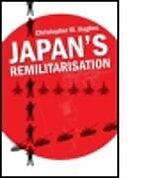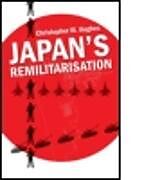Japan's Remilitarisation
Einband:
Kartonierter Einband
EAN:
9780415556927
Untertitel:
Englisch
Genre:
Politikwissenschaft
Autor:
Christopher W Hughes
Herausgeber:
Routledge
Anzahl Seiten:
188
Erscheinungsdatum:
17.04.2009
ISBN:
978-0-415-55692-7
Informationen zum Autor Christopher W. Hughes is Professor of International Politics and Japanese at the Department of Politics and International Studies, University of Warwick, UK. He was previously a Research Fellow at the University of Hiroshima, and Asahi Shimbun Visiting Professor of Mass Media and Politics in the Faculty of Law, University of Tokyo. In 200910 he will be the Edwin O. Reischauer Visiting Professor of Japanese Studies at the Department of Government/Reischauer Institute, Harvard University. His publications include Japan's Re-emergence as a 'Normal' Military Power (Adelphi 3689). Klappentext In this book, Christopher W. Hughes assesses developments in defence expenditure, civil-military relations, domestic and international military-industrial complexes, Japan's procurement of regional and global power-projection capabilities, the expansion of US-Japan cooperation, and attitudes towards nuclear weapons, constitutional revision and the use of military force. Zusammenfassung Is Japan on a path towards assuming a greater military role internationally, or has the recent military normalisation ground to a halt since the premiership of Junichiro Koizumi? In this book, Christopher W. Hughes assesses developments in defence expenditure, civilmilitary relations, domestic and international militaryindustrial complexes, Japan's procurement of regional and global power-projection capabilities, the expansion of USJapan cooperation, and attitudes towards nuclear weapons, constitutional revision and the use of military force. In all of these areas, dynamic and long-term changes outweigh Japan's short-term political logjam over security policy. Hughes argues that many post-war constraints on Japan's military role are still eroding, and that Tokyo is moving towards a more assertive military role and strengthened USJapan cooperation. Japan's remilitarisation will boost its international security role and the dominance of the USJapan alliance in regional and global security affairs, but will need to be carefully managed if it is not to become a source of destabilising tensions. Inhaltsverzeichnis Introduction 1. The Trajectory of Japan's Remilitarisation 2. Japan's Military Doctrine, Expenditure and Power Projection 3. The Transformation of Civilian Control 4. Japan's Military-Industrial Complex 5. Japan's External Military Commitments 6. The Erosion of Japan's Anti-militaristic Principles Conclusion: Japan's remilitarisation: implications and future directions Appendix: Tables and charts ...
Autorentext
Christopher W. Hughes is Professor of International Politics and Japanese at the Department of Politics and International Studies, University of Warwick, UK. He was previously a Research Fellow at the University of Hiroshima, and Asahi Shimbun Visiting Professor of Mass Media and Politics in the Faculty of Law, University of Tokyo. In 200910 he will be the Edwin O. Reischauer Visiting Professor of Japanese Studies at the Department of Government/Reischauer Institute, Harvard University. His publications include Japan's Re-emergence as a 'Normal' Military Power (Adelphi 3689).
Klappentext
In this book, Christopher W. Hughes assesses developments in defence expenditure, civil-military relations, domestic and international military-industrial complexes, Japan's procurement of regional and global power-projection capabilities, the expansion of US-Japan cooperation, and attitudes towards nuclear weapons, constitutional revision and the use of military force.
Zusammenfassung
Is Japan on a path towards assuming a greater military role internationally, or has the recent military normalisation ground to a halt since the premiership of Junichiro Koizumi? In this book, Christopher W. Hughes assesses developments in defence expenditure, civilmilitary relations, domestic and international militaryindustrial complexes, Japan's procurement of regional and global power-projection capabilities, the expansion of USJapan cooperation, and attitudes towards nuclear weapons, constitutional revision and the use of military force. In all of these areas, dynamic and long-term changes outweigh Japan's short-term political logjam over security policy. Hughes argues that many post-war constraints on Japan's military role are still eroding, and that Tokyo is moving towards a more assertive military role and strengthened USJapan cooperation. Japan's remilitarisation will boost its international security role and the dominance of the USJapan alliance in regional and global security affairs, but will need to be carefully managed if it is not to become a source of destabilising tensions.
Inhalt
Introduction 1. The Trajectory of Japan's Remilitarisation 2. Japan's Military Doctrine, Expenditure and Power Projection 3. The Transformation of Civilian Control 4. Japan's Military-Industrial Complex 5. Japan's External Military Commitments 6. The Erosion of Japan's Anti-militaristic Principles Conclusion: Japan's remilitarisation: implications and future directions Appendix: Tables and charts

Leider konnten wir für diesen Artikel keine Preise ermitteln ...
billigbuch.ch sucht jetzt für Sie die besten Angebote ...
Die aktuellen Verkaufspreise von 5 Onlineshops werden in Realtime abgefragt.
Sie können das gewünschte Produkt anschliessend direkt beim Anbieter Ihrer Wahl bestellen.
Loading...
Die aktuellen Verkaufspreise von 5 Onlineshops werden in Realtime abgefragt.
Sie können das gewünschte Produkt anschliessend direkt beim Anbieter Ihrer Wahl bestellen.
| # | Onlineshop | Preis CHF | Versand CHF | Total CHF | ||
|---|---|---|---|---|---|---|
| 1 | Seller | 0.00 | 0.00 | 0.00 |
